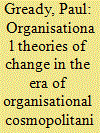| Srl | Item |
| 1 |
ID:
124189


|
|
|
|
|
| Publication |
2013.
|
| Summary/Abstract |
This article argues that organisational cosmopolitanism is an increasingly common characteristic of international ngos. Cosmopolitanism goes beyond international staffing, to include multi-sectoral mandates, multiple skill sets and multiple levels of working. It also challenges the orthodoxies of its parent discourses. Change within such international ngos represents a new frontier in organisational change, as its ambit and ambition extends beyond the demands of more conventional intra-sectoral change. Using ActionAid as a case study, the article explores what might be gained by rendering explicit previously implicit theories of change within such a context. It focuses on inward looking, organisational change but also explores connections to outward looking, operational change. The article highlights two change-related concepts that are of relevance to cosmopolitan organisations: organisational archaeologies (implying layered, hybrid, evolutionary change) and cycles of misalignment followed by realignment. Lessons learned for cosmopolitan organisations from the ActionAid case study suggest that cycles of internal reflection and planning are an effective way of managing other aspects of change.
|
|
|
|
|
|
|
|
|
|
|
|
|
|
|
|
| 2 |
ID:
168740


|
|
|
|
|
| Summary/Abstract |
Human rights is in crisis in the UK. It lacks significant political backing and public support. This ‘insider account’ of York becoming a human rights city suggests that there is a need to rethink approaches to human rights. The article looks at the strategies adopted in the city; the annual city‐based indicator report which provides the key reference point for all local activities; and the declaration of York as a ‘human rights city’ in 2017 alongside its subsequent impact. The discussion is linked to two debates within human rights: how to define and build a culture of human rights, and what it means for human rights to be truly relevant at a local level. The new approach advocated can be summarised as participatory, locally informed, and related to everyday concerns.
|
|
|
|
|
|
|
|
|
|
|
|
|
|
|
|
| 3 |
ID:
099194


|
|
|
|
|
| Publication |
2010.
|
| Summary/Abstract |
Land reform and post-genocide justice and reconciliation are arguably the two most pressing challenges facing Rwanda. Both will only be delivered by collaboration between government, civil society, and international donors. This article explores the realignment of these actors within post-genocide and post-conflict policy-making processes. Rwanda is a hard case for NGOs and civil society, in that both the internal freedoms of democracy and the external support structures that often assist resistance to authoritarian rule are lacking. Further complicating matters, the interplay between the moral legitimacy of the Rwandan government and its material dependence on donors shapes the opportunities and constraints of all policy actors. The article proceeds by profiling the policy context and relevant policy actors; mapping the land reform and gacaca policy processes, and the contribution of two civil society actors, LANDNET and Penal Reform International (PRI), to these processes; and concludes by evaluating the determinants of civil society effectiveness. The core argument is that spaces for civil society engagement in policy processes are ad hoc and personalized, rather than based on institutional relationships between society and the state.
|
|
|
|
|
|
|
|
|
|
|
|
|
|
|
|